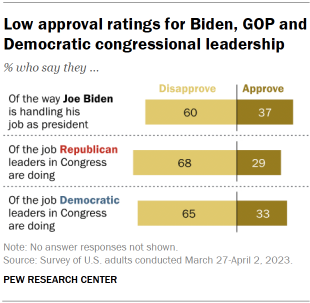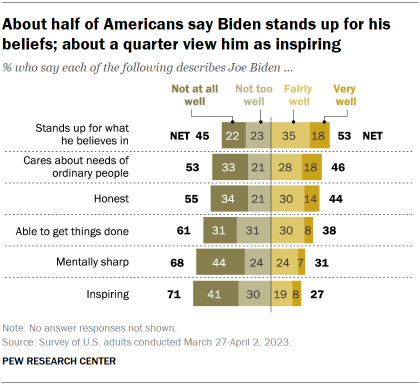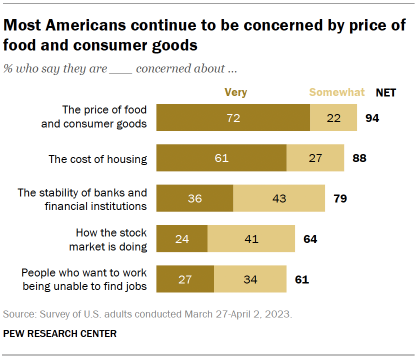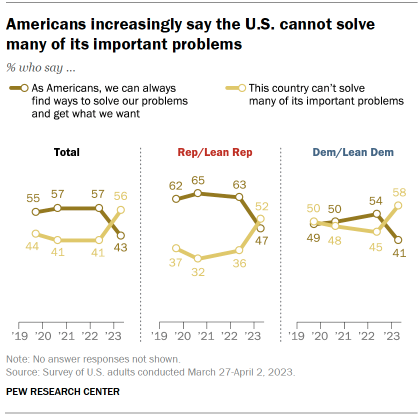Sharp rise in share of the public saying the country is unable to solve its major problems
Pew Research Center conducted this study to understand how the public views Joe Biden, congressional leaders and the state of the country. For this analysis, we surveyed 5,079 adults from March 27-April 2, 2023. Everyone who took part in this survey is a member of the Center’s American Trends Panel (ATP), an online survey panel that is recruited through national, random sampling of residential addresses. This way nearly all U.S. adults have a chance of selection. The survey is weighted to be representative of the U.S. adult population by gender, race, ethnicity, partisan affiliation, education and other categories. Read more about the ATP’s methodology.
Here are the questions used for the report and its methodology.
Nearly three months after the dawn of a new era of divided government in Washington, Americans express highly negative views of President Joe Biden, the congressional leadership in both parties and Congress more broadly.

Americans’ pessimistic mood extends beyond politics. Views of the economy remain overwhelmingly negative, and nearly half of Americans (46%) expect economic conditions to worsen over the next year.
Moreover, in a striking change since just last year, there has been a sharp rise in the share of Americans who say the country cannot solve many of its important problems, from 41% then to 56% today. Americans have even become more skeptical of the public’s political wisdom. Roughly three-quarters of the public (76%) say they have little or no confidence in the wisdom of the American people in making political decisions, up from 62% in 2021.
A new Pew Research Center survey, conducted March 27-April 2, 2023, among 5,079 members of the Center’s nationally representative American Trends Panel, finds that Biden’s job rating remains below 40%. Just 37% approve of his job performance, while 60% disapprove.
However, just a third of Americans approve of the way Democratic congressional leaders are handling their jobs, and even fewer (29%) give positive job ratings to Republican leaders.
While the public has long been critical of Congress, just 26% have a favorable opinion of the new Congress. In contrast to recent years, when Republicans were more likely to have negative views of Democratic-led Congresses, members of both parties now have virtually the same low opinion of Congress: 28% of Democrats and Democratic-leaning independents and 26% of Republicans and Republican leaners have a favorable view.
Since taking control of the House in January, Republicans have launched multiple investigations, including probes of Biden administration policies and allegations of wrongdoing by members of Biden’s family. The survey finds that a 59% majority of Americans have little or no confidence the GOP-led investigations will be fair and reasonable; roughly four-in-ten (39%) expect them to be fair.
Biden continues to engender, at most, modest levels of confidence for his handling of major issues. While half of Americans say they are very or somewhat confident in Biden’s ability to respond effectively to a natural disaster, ratings for his handling of other issues, including the economy and working effectively with Congress, are in the mid-to-high 30% range.

Meanwhile, Biden’s personal image is a study in contrasts: While 53% of Americans credit him for standing up for his beliefs, only about half as many (27%) describe him as inspiring. More than four-in-ten say he cares about the needs of ordinary Americans (46%) and is honest (44%), but far fewer (31%) say the phrase “mentally sharp” describes him very or fairly well. Republicans give Biden low ratings across all personal dimensions asked about on the survey. While large majorities of Democrats give him high marks on several traits, smaller shares say he is mentally sharp (56%) or inspiring (49%).
Biden also receives less credit from the public for improving the tone of political debate in the United States than he did during the early months of his presidency. Nearly four-in-ten adults (39%) say he has changed the tone of political debate for the worse, while just 20% say he has changed it for the better; 39% say he has not changed it much either way. In April 2021, a few months into his presidency, far more Americans said he had changed the tone of debate for the better (44%) than the worse (29%).

The survey finds that there has been no improvement in Americans’ views of economic conditions since January: Currently, just 19% rate economic conditions as excellent or good, while 46% say they are only fair and 35% view conditions as poor. And while 46% expect economic conditions to get worse over the next year, just 17% say they will improve; 36% say they will be about the same as today. The share predicting economic conditions to worsen has ticked up 6 percentage points since January.
The cost of food, consumer goods and housing remain major concerns for the public. Nearly all Americans are at least somewhat concerned about the price of food and consumer goods, with 72% saying they are very concerned. A majority (61%) also expresses a high degree of concern about housing prices. Other economic issues – including the stability of banks and financial institutions – draw lower levels of concern.
Other important findings from the survey
Little change in the public’s views of Supreme Court. About half of the public (48%) views the Supreme Court favorably, while 50% view it unfavorably. These views are largely unchanged since last August, following the court’s controversial rulings on abortion and in other high-profile cases. The court’s favorability rating remains at a three-decade low. And opinions about the Supreme Court continue to be deeply divided along partisan lines. More than twice as many Republicans (68%) as Democrats (31%) view the court favorably.

A majority of the public says the country can’t solve many major problems. As recently as about a year ago, a majority (57%) said that “as Americans, we can always find a way to solve our problems”; fewer (41%) said the country could not solve many of its important problems. Today, those views have flipped – more say the country cannot solve problems than say it can. The change has come fairly equally among members of both parties; a majority of Democrats (58%) and 52% of Republicans view the country as unable to solve key problems.
Republicans increasingly view the U.S. economic system as unfair. The share of Americans who say the economic system unfairly favors powerful interests has ticked up in recent years, with virtually all of the change coming among Republicans. Among the public overall, 77% say the system unfairly favors powerful interests, while 23% say it is generally fair. About two-thirds of Republicans (68%) say the economic system unfairly favors the powerful, up from 50% in 2019. There has been less change among Democrats, who overwhelmingly (85%) say the system is unfair.


